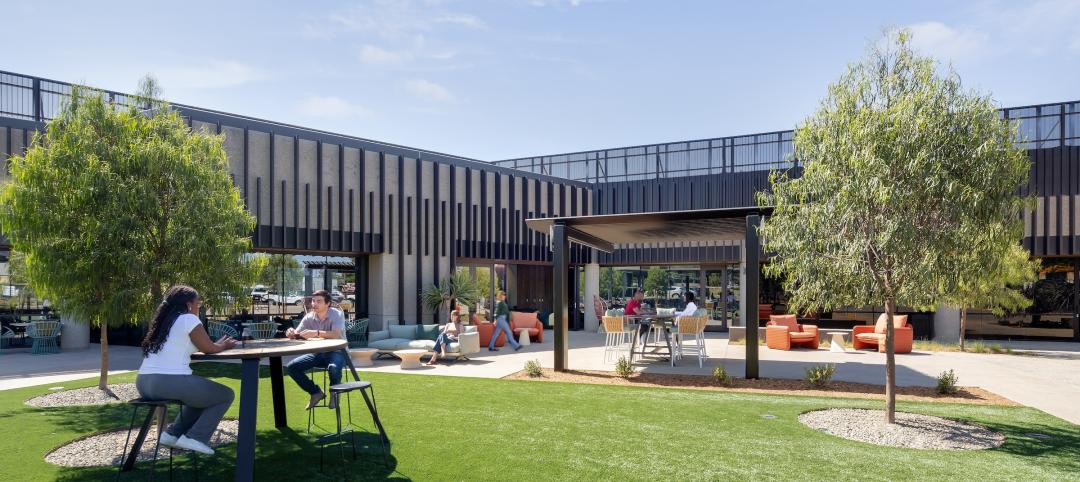Art Gensler, FAIA, FIIDA, RIBA, cofounder of Gensler, the world’s largest architecture firm, passed away Monday morning at his home in Mill Valley, Calif., at the age of 85.
The San Francisco Chronicle reported that Gensler had been battling lung disease over the last 18 months.
The firm was originally called M. Arthur Gensler Jr. and Associates, when Gensler, his wife Drucilla, and James Follett, a draftsperson, started the company in 1965. Gensler is widely credited with creating the blueprint for how professional service firms are organized and managed. He led Gensler until 2005, when the company’s Board of Directors introduced its current co-leadership management structure. He stepped down as chairman in 2010 though continued serving as an advisor to the firm for seven more years.
During his leadership tenure, Gensler saw the firm expand into a full-service practice whose interdisciplinary approach he helped craft. The firm that Art Gensler founded currently serves 28 practice areas from 50 offices around the globe. The company’s revenue hit $1.55 billion in 2020, continuing an upward trend that dated to 2010. Gensler is 100% owned by its 5,200 employees through direct shares and its ESOP plan.
In its 2020 annual report, Gensler stated that in 2019 alone its employees had worked on more than 7,000 projects representing over 1.5 billion sf of space. Its portfolio that year was designed to save over 16 million tons of CO2 emissions.
“Art’s lasting legacy is an ethos that only he could have created—a standard that allowed the firm to grow and prosper,” wrote Gensler’s co-CEOs Diane Hoskins, FAIA, NCARB, and Andy Cohen, FAIA, IIDA, in a remembrance they posted this evening. They added that Gensler championed an adaptive, proactive, and client-focused approach “that treated service as a privilege and clients as partners.”
ORIGINALLY FOCUSED ON OFFICE INTERIORS
Born in Brooklyn, N.Y., in 1935, Gensler earned a degree from Cornell University’s College of Architecture in 1958. Upon graduation, he worked for architecture firms in New York and Jamaica. He and his wife Drue migrated to California in the early 1960s, where Gensler worked for a few architectural firms, including Wurster, Bernardi, and Emmons. While at Wurster, he played a vanguard role establishing design standards for the Bay Area Rapid Transit system, then under construction.
When he opened his own shop, Gensler initially pioneered interiors for new office buildings. The firm started expanding domestically in the 1970s and 1980s, and then internationally in the ‘80s and ‘90s. (Among his accolades, Gensler was a professional member of the Royal Institute of British Architects.)
In 2015, he published Art’s Principles, which chronicled his 50 years in business and lessons learned. The book covers such topics as leadership, talent acquisitions and growth strategies.
Last January, Gensler made a $10 million gift to Cornell’s College of Architecture, Art, and Planning, whose program he helped create in 2006. As a result of that gift, the New York City location will be renamed the Gensler Family AAP NYC Center.
Gensler was predeceased by his wife, who died in 2017. He is survived by four sons and their families, 10 grandchildren and one great-granddaughter.
Related Stories
MFPRO+ New Projects | Oct 30, 2024
BIG’s One High Line finally reaches completion in New York City’s West Chelsea neighborhood
One High Line, a luxury residential project spanning a full city block in New York’s West Chelsea neighborhood, reached completion this summer following years of delays related to investor lawsuits.
Urban Planning | Oct 30, 2024
Bridging the gap: How early architect involvement can revolutionize a city’s capital improvement plans
Capital Improvement Plans (CIPs) typically span three to five years and outline future city projects and their costs. While they set the stage, the design and construction of these projects often extend beyond the CIP window, leading to a disconnect between the initial budget and evolving project scope. This can result in financial shortfalls, forcing cities to cut back on critical project features.
MFPRO+ New Projects | Oct 30, 2024
Luxury waterfront tower in Brooklyn features East River and Manhattan skyline views
Leasing recently began for The Dupont, a 41-story luxury rental property along the Brooklyn, N.Y., waterfront. Located within the 22-acre Greenpoint Landing, where it overlooks the newly constructed Newtown Barge Park, the high-rise features East River and Manhattan skyline views along with 20,000 sf of indoor and outdoor communal space.
Libraries | Oct 30, 2024
Reasons to reinvent the Midcentury academic library
DLR Group's Interior Design Leader Gretchen Holy, Assoc. IIDA, shares the idea that a designer's responsibility to embrace a library’s history, respect its past, and create an environment that will serve student populations for the next 100 years.
Resiliency | Oct 29, 2024
Climate change degrades buildings slowly but steadily
While natural disasters such as hurricanes and wildfires can destroy buildings in minutes, other factors exacerbated by climate change degrade buildings more slowly but still cause costly damage.
Office Buildings | Oct 29, 2024
Editorial call for Office Building project case studies
BD+C editors are looking to feature a roundup of office building projects for 2024, including office-to-residential conversions. Deadline for submission: December 6, 2024.
Healthcare Facilities | Oct 28, 2024
New surgical tower is largest addition to UNC Health campus in Chapel Hill
Construction on UNC Health’s North Carolina Surgical Hospital, the largest addition to the Chapel Hill campus since it was built in 1952, was recently completed. The seven-story, 375,000-sf structure houses 26 operating rooms, four of which are hybrid size to accommodate additional equipment and technology for newly developed procedures.
Multifamily Housing | Oct 28, 2024
A case for mid-rise: How multifamily housing can reshape our cities
Often referred to as “five-over-ones,” the mid-rise apartment type is typically comprised of five stories of apartments on top of a concrete “podium” of ground-floor retail. The main criticism of the “five-over-one” is that they are often too predictable.
Sports and Recreational Facilities | Oct 24, 2024
Stadium renovation plans unveiled for Boston’s National Women’s Soccer League
A city-owned 75-year-old stadium in Boston’s historic Franklin Park will be renovated for a new National Women’s Soccer League team. The park, designed by Fredrick Law Olmsted in the 1880s, is the home of White Stadium, which was built in 1949 and has since fallen into disrepair.
Laboratories | Oct 23, 2024
From sterile to stimulating: The rise of community-centric life sciences campuses
To distinguish their life sciences campuses, developers are partnering with architectural and design firms to reimagine life sciences facilities as vibrant, welcoming destinations. By emphasizing four key elements—wellness, collaboration, biophilic design, and community integration—they are setting their properties apart.

















